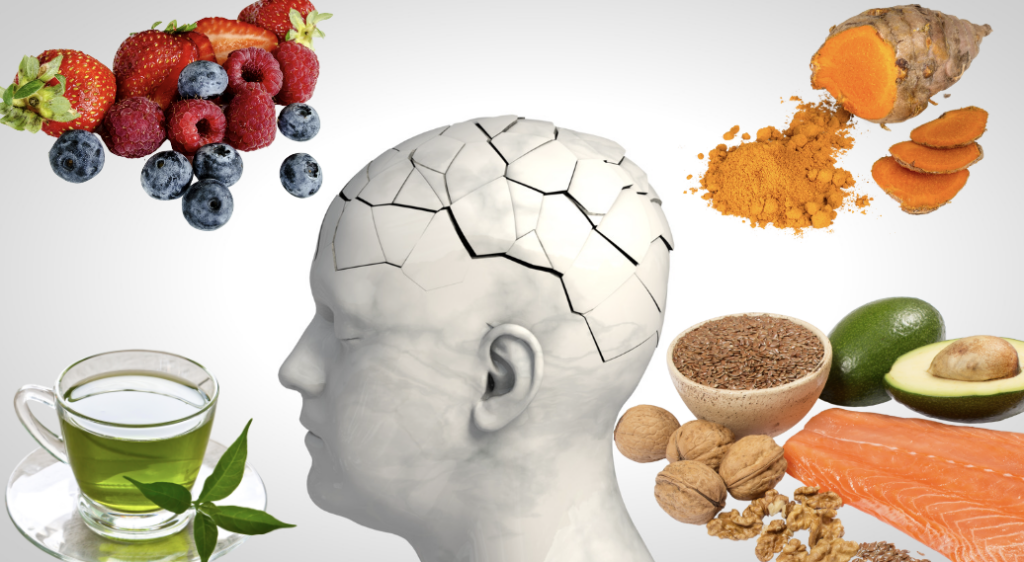What to Eat and Drink
What are the Foods to Combat Alzheimer’s and Dementia
Combating Alzheimer’s and dementia with foods is a proactive and powerful approach to brain health. As millions of people throughout the world continue to suffer from neurodegenerative diseases, the significance of nutrition in promoting cognitive function has received more attention. According to emerging studies, certain foods have neuroprotective effects that can help to slow cognitive decline and potentially lower the risk of acquiring Alzheimer’s and dementia.
In this article, we will look at the power of foods as medicine, specifically a variety of nutrient-rich meals that have been shown to improve brain health and cognitive function. From omega-3 fatty acids found in fatty fish to antioxidant-rich fruits and vegetables, we look at the dietary options that may help preserve memory, cognition, and overall brain health. Individuals who understand the relationship between nutrition and brain function can make more educated decisions to prevent cognitive decline and improve long-term brain health.

Understanding Alzheimer’s and Dementia
Defining Cognitive Impairment
Cognitive impairment is a word that describes a deterioration in cognitive performance. It is a typical symptom of Alzheimer’s and dementia. Cognitive impairment can damage a person’s memory, reasoning, language, and judgment.
Symptoms and Diagnosis
The symptoms of Alzheimer’s and dementia differ from person to person. Common symptoms include amnesia, disorientation, difficulties with language, difficulty doing routine tasks, and changes in mood or behavior.
To diagnose Alzheimer’s and dementia, clinicians may use cognitive tests, brain scans, and blood testing. They may also investigate the presence of tau and beta-amyloid plaques in the brain. These are the proteins related to Alzheimer’s disease.
It is vital to understand that moderate cognitive impairment does not invariably progress to Alzheimer’s or dementia. In some circumstances, it may be an expected component of the aging process. However, if cognitive impairment interferes with a person’s everyday life, they should consult a doctor.
While there is no cure for Alzheimer’s or dementia, there are techniques to treat symptoms and reduce the disease’s course. One method is through diet. According to research, certain meals can help minimize the risk of cognitive decline and boost brain function.

Dietary Factors Influencing Brain Health
Essential Nutrients for Cognitive Function
A nutritious diet is vital for keeping your brain healthy. Certain nutrients have been found to be very beneficial for cognitive performance. These contain vitamins, antioxidants, and omega-3 fatty acids.
Fish, nuts, and seeds contain omega-3 fatty acids. They are necessary for brain function and have been demonstrated to increase memory and cognitive performance. Vitamins B6, B12, and folate are beneficial to brain function and can be found in fruits, vegetables, and whole grains. Berries, green tea, and turmeric include antioxidants such as flavonoids and curcumin, which have been demonstrated to boost cognitive function and lower the chance of developing dementia.
Foods to Avoid and Why
Certain foods may have a harmful impact on brain function and should be avoided. These include processed foods, red meat, saturated fats, and sugar.
Sugar, salt, and bad fats are common ingredients in processed foods, all of which can be detrimental to brain health. Red meat, particularly in big quantities, has been related to an increased risk of dementia. Saturated fats, such as butter and cheese, can cause inflammation in the body, which can be detrimental to brain function. Sugar, especially when eaten in sugary drinks, can cause inflammation and dehydration, both of which can impair brain function.
In addition to avoiding these meals, remain hydrated and eat healthy fats like olive oil and avocados. A balanced diet can help people enhance their brain health and lower their chances of Alzheimer’s and dementia.

Specific Diets and Their Impact
The Mediterranean Diet
The Mediterranean diet is widely recognized for its health benefits, notably in terms of lowering the risk of heart disease and stroke. However, studies have indicated that eating a Mediterranean diet can assist in lowering the chance of acquiring Alzheimer’s and dementia. The Mediterranean diet includes plenty of fruits, vegetables, whole grains, legumes, nuts, and healthy fats like olive oil. It also includes modest amounts of fish, chicken, and dairy products, but limits red meat and processed foods.
MIND Diet and DASH Diet
Other diets that have been demonstrated to improve brain function include the MIND diet and the DASH diet. The MIND diet combines the Mediterranean diet and the DASH diet, or Dietary Approaches to Stop Hypertension. The MIND diet emphasizes foods high in nutrients associated with improved brain health, such as leafy greens, berries, nuts, and whole grains. The DASH diet emphasizes foods high in potassium and low in salt, such as fruits, vegetables, and low-fat dairy.
Other Dietary Considerations
In addition to specialized diets, there are other dietary factors that can help prevent Alzheimer’s and dementia. For example, eating a high-fiber diet has been related to a lower chance of getting dementia. Fiber-rich foods include fruits and vegetables, whole grains, and legumes. Minerals like zinc and magnesium have been linked to improved brain function and can be found in foods like nuts, seeds, and leafy greens. Complex carbs, which are found in whole grains and starchy vegetables, can also aid in improving brain health.
It is crucial to emphasize that, while foods can help reduce the incidence of Alzheimer’s and dementia, it is only one of many factors. Other lifestyle factors that influence brain health include exercise, sleep, and social interaction.

Lifestyle Choices and Brain Health
Maintaining a healthy lifestyle is critical for lowering the risk of Alzheimer’s and dementia. While there is no cure for these conditions, research has shown that some lifestyle changes can help prevent memory loss, cognitive decline, and concentration problems.
The Role of Physical Activity
Physical activity is an important component of a healthy lifestyle and can help to improve brain function. According to studies, regular exercise can aid improve cognitive performance, such as memory and concentration. It may also assist in lowering the chance of acquiring Alzheimer’s and dementia.
Adults should engage in at least 150 minutes of moderate-intensity aerobic activity per week. This can involve vigorous walking, riding, and swimming. Resistance training, such as weightlifting, can help you retain muscle mass and improve your overall health.
Mental Exercise and Education
Mental exercise is just as vital as physical activity for brain health. Reading, solving puzzles, and learning a new language are all mentally engaging hobbies that might aid boost cognitive function.
Education also has an important role in lowering the risk of Alzheimer’s and dementia. According to studies, those with more education are less prone to suffer certain disorders. This could be because schooling promotes cognitive reserve, which helps to preserve the brain from injury.
To summarize, living a healthy lifestyle is critical in lowering the risk of Alzheimer’s and dementia. Physical activity and mental stimulation are both important components of a healthy lifestyle, and education can help reduce the incidence of these diseases. Individuals can help safeguard their brain health and lower the risk of cognitive decline by adopting healthy lifestyle habits and engaging in frequent physical and mental activity.
Conclusion
To summarize, while there is no definite treatment for Alzheimer’s and dementia, new research indicates that dietary choices can play an important role in slowing cognitive decline and promoting brain health. Individuals can protect their brains from Alzheimer’s and dementia by including nutrient-rich foods such as fatty fish, fruits, vegetables, nuts, and whole grains in their daily meals. Furthermore, following a Mediterranean-style diet high in plant-based foods and healthy fats has shown encouraging outcomes in lowering the risk of cognitive impairment. However, it is critical to approach food modifications as part of a comprehensive lifestyle plan that includes frequent physical activity, mental stimulation, social involvement, and enough sleep. Individuals who prioritize brain-healthy meals and lifestyle behaviors can take proactive actions to preserve cognitive function and maintain a higher quality of life as they age.
Trusted Health, Wellness, and Medical advice for your well-being


